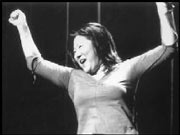NOTORIOUS C.H.O.
directed by Lorene Machado
with Margaret Cho
opens Aug. 9 at Varsity
You’re going to laugh your way through almost all of the 90 minutes it takes Margaret Cho to leave no stone unturned in Notorious C.H.O., the second cinematic record of her popular stand-up routine. Yet as with I’m the One That I Want before, the “almost” factor of the film is the make-it-or-break-it point for anyone who isn’t already a rabid fan.
At her best, Cho talks the way you talk to your closest friends, with a foul-mouthed, unconcerned intimacy; it feels revelatory to hear such candor onstage. Testimonials from the adoring audience arriving at the sold-out venue give an appreciation for the niche Cho has carved for herself in the straight-male-dominated world of comedy. Her defiant I-am-what-I-am persona fills the crowd with beaming gays, lesbians, Asian Americans, and appreciative heterosexual hipsters. Cho just won’t be made to feel bad about herself, her uninhibited sexuality, or the art of spoofing the unspoofable. Striking a deadpan tone concerning American pride at Ground Zero after Sept. 11, she claims, “I was there every day—giving blow jobs to rescue workers. You find out a lot about yourself in times of crisis.”
But she can never leave well enough alone—she needs to feel that, comedian or no, her connection to her fans is serious stuff. A truly great performer can get away with hairbreadth shifts between audience solidarity and satire. Sandra Bernhard regularly dinks her admirers for inhaling guilty pop-culture crap like People magazine while at the same time letting them know she’s voraciously enjoying the sick kick of it all, too. Cho, however, stops her own jokes to lecture her crowd about the conformist evils of Vanity Fair as if she has no clue that everyone in the room is a subscriber.
Whenever Cho gets her peace-rally voice on and starts speechifying for us boys on how great gay men are, you clench your sphincter. She’s trying to work herself in someplace you don’t need her to go. Before the hysterical encore about her mother, Cho ends the show with another soapbox rallying cry about how we’re all a part of a “revolution”—even though we’ve figured that out long before she says it. She’s explaining something we’ve already appreciated and understood in the humor, as though underlining her message were the only way for us to find release. She should leave it to the laughter.
swiecking@seattleweekly.com 








